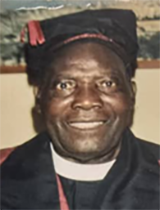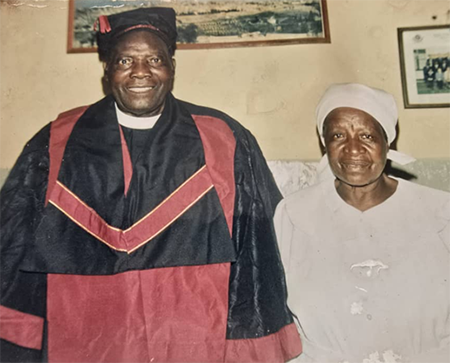Chalera, Stanley Patisi

S. P. Chalera, as he was popularly known, was a much-loved pastor in Malawi and an outstanding leader of the Nkhoma Synod of the Church of Central Africa Presbyterian. He was born on October 12, 1932, at Chalera village in Lilongwe District in central Malawi. He was the fourth-born son in a family of six children, four boys and two girls. However, he also had several half-brothers and half-sisters born of the same father but different mothers, since his father Chief Kalekeni Chalera was a polygamist. Following the Chewa tradition, his father ensured that all his children, including Stanley, were initiated into the Nyau secret society. As a young man he became a Nyau dancer (makanja) as well as a Nyau dramatist. As strong Nyau adherents, the family did not encourage the children to go to school so initially Stanley did not have any opportunity to access formal education. [1]
Just at this time, however, a catechist, Mr Nkhoma, started teaching the local children under a tree. He concentrated on the reading and writing of vowels and consonants. Most of the children were writing on the sand and only very few could use the slates which the teacher would retrieve at the end of each day. Mr Nkhoma noticed that Stanley was progressing very well and recommended that he should go to do Sub ‘A’ class at Malingunde where the Nkhoma Synod had a Mission school. His father refused to support him in this venture, but he was determined to advance his education and supported himself at Malingunde through casual labour. After some time, he left Malingunde and moved to Nkhoma Mission where he aimed to benefit from missionary education. With no one to support him he led a life of deep poverty. [2] By chance, his father was visited by Chief Mwase of Kasungu and when he saw that Stanley was able to read, he took him to his headquarters at Kasungu where he was able to complete his education up to Standard 6. [3]
On his return from Kasungu in 1956 he married his cousin Felesta Mopana in 1956. It was an arranged marriage within the extended family. Felesta had been among the women who were ululating and clapping hands when Stanley was dancing makanja. [4] The couple settled down to a life of farming and started attending the small church in their village where Mr Nkhoma, Stanley’s former teacher, was leading catechumen classes. Both Stanley and Felesta entered the catechumen class and were baptized at Malingunde CCAP by Reverend Chisanu. He was then chosen to be a church elder at the small church in his village. He now completely disowned the Nyau secret society although it was popular with many people of his age. In time the couple were blessed with ten children, though two died in infancy. The surviving children are Clement, Kalekeni, Andrea, Alenar, Peter, Grace, Mdalireni, and Louise.
In 1958, after their first son was born, Chalera went to Zambia where he found employment as a bus conductor. When he was promoted to Bus Inspector in 1960, he decided to come home on holiday and then return with Felesta and their son. A week before he was due to return to Zambia, Mr Nkhoma, his old teacher, came and told him that he had been appointed again as a church elder at Malingunde. He refused on the basis that he was working in Zambia and that he had only returned in order to bring his wife to join him. But three days later, he told Felesta that he had a sleepless night as God had spoken to him, saying that he should not go back to Zambia but rather serve him as a church elder and later as a pastor. With this clarity of vision, he decided not to go back to Zambia and accepted the church elder position. [5]
When he explained his vision to Rev. Chisanu at Malingunde CCAP, his was one of two names brought to the Kirk Session as possible ministerial candidates. Since the other person came from a Christian family and Chalera came from a traditionalist family, the other person was selected to be recommended for theological training. It was only when he withdrew after joining a different church, that Chalera was recommended. Thus, he enrolled at Nkhoma Theological College at the start of 1963. At that time completion of primary education was a sufficient qualification to be admitted but Chalera was keen to strengthen his academic credentials and gained a Junior Certificate (after two years of secondary education) in 1970.
In 1966 he was ordained and began the long ministry in Nkhoma Synod that took him to nine different churches between 1966–2009. [6] As a pastor he had some distinctive qualities. He was very perceptive and had a great sense of humour. This served him well as he was able to dispel any tension that might arise when sensitive issues were being discussed at church meetings. He had a fatherly way of working and could accommodate people from all walks of life through his preaching and leadership of various church gatherings. He was never arrogant but engaged people humbly, which gained him much love and respect from people of all ages and backgrounds. He had a Christ-like openness to marginalized members of society and was always ready to learn from them. He was resilient and would never complain about his own domestic situation at times when the church was struggling to support him financially. [7]
Chalera proved to be a highly effective minister, establishing new congregations almost everywhere he served, including Katondo CCAP, Nsungwi CCAP, Kalambo CCAP, Mvama CCAP, Chikuluti CCAP, Magwero CCAP, Kambiya CCAP. During his time at Dzenza, he initiated a church construction project, one of the biggest in Malawi, replacing the old church from the missionary era with a huge new one. Additionally, he improved the buildings of many of the Dzenza prayer houses (outstations). He was also known for the spiritual quality of his ministry, always challenging people to examine themselves and make sure they were on the way of salvation. He was skilled in settling disputes, whether in family, community or church. With the help of his mediation, fighting parties were shaking hands in no time.
Chalera also served several successive terms as either Moderator or Vice-Moderator of Nkhoma Synod, completing more than 15 years in these offices, more than anyone else in the history of the Synod. [8] When he was elected for a second term as Moderator he said: “I know I have been elected for second time because God has seen that there are some areas where I am not doing well.” He also joked that he was “M to M” – Makanja to Moderator, reflecting on his journey from Nyau dancer to the highest office in his Church. [9] His gift for summarising Synod resolutions in a few words was much appreciated. As Moderator, he initiated the construction of Nkhoma Synod Conference Centre at Lilongwe CCAP. He served as a Moderator during a time of financial difficult for the Synod and carried out his travels by use of public transport rather than official vehicles. One of his responsibilities was to conduct a communion service for the former Head of State, Dr. Hasting Kamuzu Banda, when he was released from house arrest in the mid-1990s. He also travelled internationally as a representative of his Church. This took him to South Africa, the Netherlands, South Korea, Zambia, and Mozambique. He received an honorary doctorate degree from Zoe University in United States of America (USA) in recognition for his achievements as Nkhoma Synod Moderator as well as his work as a pastor.
Chalera retired in September 2009 and settled at Nanjiri in Lilongwe. After some time, it became apparent that his health was deteriorating and he died peacefully on September 24, 2014, at Daeyang Luke Hospital. Both the Government and the Opposition paid tribute to his extraordinary contribution to the church and to the nation.
Haswell Mwale
Notes:
- Kalekeni Chalera, son of Stanley Chalera, interview by author, July 20, 2024, Lilongwe.
- Kalekeni Chalera, interview by author, July 20, 2024, Lilongwe.
- Kalekeni Chalera, interview by author, July 20, 2024, Lilongwe.
- Rev. Bright Mkomba, interview by author, September 9, 2024, Ntcheu.
- Felesta Mopana Chalera, wife of Stanley Chalera, interview by author, July 20, 2024, Lilongwe.
- These churches included: Matenje CCAP (1966-68), Mang’a CCAP (1969-1972), Mpatsa CCAP (1972-1975), Chimwang’ombe CCAP (1975-78), Mang’a CCAP (1978-1982), Lilongwe CCAP (1982-86), Kapiri CCAP (1986-90), Masintha CCAP (1990-96), and Dzenza CCAP (1996-2009).
- Gift Matandika, Session Clerk of Masintha CCAP, interview by author, October 5, 2024, Lilongwe.
- Rev. Isaac Chibowa, interview by author, September 26, 2024, Zomba.
- Kalekeni Chalera, interview by author, July 20, 2024, Lilongwe.
Bibliography
Chalera, Felesta Mopana. Interview by author. July 20, 2024, Lilongwe. Chalera, Kalekeni. Interview by author. July 20, 2024, Lilongwe. Chibowa, Rev. Isaac. Interview by author. September 26, 2024, Zomba. Matandika, Gift. Interview by author, October 5, 2024, Lilongwe. Mkomba, Rev. Bright. Interview by author. September 9, 2024, Ntcheu.
This article, submitted in December 2024, was researched and written by Haswell Mwale, minister of Katayauta congregation in the Church of Central Africa Presbyterian Nkhoma Synod, under the supervision of Professor Kenneth R. Ross as one of the requirements of the Church History course on the MTh in Contextual Theology at Zomba Theological University.
Photo Gallery
Rev. S. P. Chalera and Mrs Felesta Chalera




